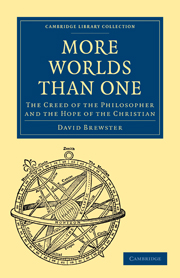Book contents
- Frontmatter
- Contents
- PREFACE
- INTRODUCTION
- CHAP. I Religious Aspect of the Question
- CHAP. II Description of the Solar System
- CHAP. III The Geological Condition of the Earth
- CHAP. IV Analogy between the Earth and the other Planets
- CHAP. V The Sun, Moon, Satellites, and Asteroids
- CHAP. VI The Motion of the Solar System round a distant Centre
- CHAP. VII Religious Difficulties
- CHAP. VIII Single Stars and Binary Systems
- CHAP. IX Clusters of Stars and Nebulæ
- CHAP. X General Summary
- CHAP. XI Reply to Objections drawn from Geology
- CHAP. XII Objections from the Nature of Nebulæ
- CHAP. XIII Objections from the Nature of the Fixed Stars and Binary Systems
- CHAP. XIV Objections from the Nature of the Planets
- CHAP. XV The Future of the Universe
CHAP. XI - Reply to Objections drawn from Geology
Published online by Cambridge University Press: 29 August 2010
- Frontmatter
- Contents
- PREFACE
- INTRODUCTION
- CHAP. I Religious Aspect of the Question
- CHAP. II Description of the Solar System
- CHAP. III The Geological Condition of the Earth
- CHAP. IV Analogy between the Earth and the other Planets
- CHAP. V The Sun, Moon, Satellites, and Asteroids
- CHAP. VI The Motion of the Solar System round a distant Centre
- CHAP. VII Religious Difficulties
- CHAP. VIII Single Stars and Binary Systems
- CHAP. IX Clusters of Stars and Nebulæ
- CHAP. X General Summary
- CHAP. XI Reply to Objections drawn from Geology
- CHAP. XII Objections from the Nature of Nebulæ
- CHAP. XIII Objections from the Nature of the Fixed Stars and Binary Systems
- CHAP. XIV Objections from the Nature of the Planets
- CHAP. XV The Future of the Universe
Summary
In the preceding chapters we have submitted to the reader the facts and arguments by which the doctrine of a plurality of worlds may be maintained, and we have, at the same time, endeavoured to answer a variety of objections of a moral and scientific nature, which naturally presented themselves in discussions involving so many considerations. We have now, however, a more arduous duty to perform. The author of the Essay to which we have frequently had occasion to refer, has devoted a whole volume to an elaborate attack upon the doctrine we have been supporting. With acquirements of the highest order, and talents of no common kind, which, we think, might have been more usefully employed, he has marshalled all the truths and theories of geology, and all the facts of astronomy, against popular and deeply cherished opinions—opinions which the humblest Christian has shared with the most distinguished philosophers and divines, and which no interests, moral or religious, require us to surrender. In questions of doubtful speculation with which vulgar error is largely mingled, we applaud the writer who boldly girds himself for the task of exposing presumption and ignorance, however generally they may prevail; but in the case with which we are dealing, where the opinions assailed are entrenched in right feeling and embalmed in the warmth of the affections, and where they are as probable as the theories and speculations by which they are to be superseded, we can ascribe to no better feeling than a love of notoriety any attempt to ridicule or unsettle them.
- Type
- Chapter
- Information
- More Worlds Than OneThe Creed of the Philosopher and the Hope of the Christian, pp. 198 - 208Publisher: Cambridge University PressPrint publication year: 2009First published in: 1854



